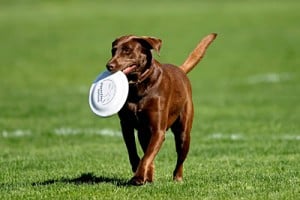8/5/2014
Hello everyone!
This is Sharda again for another Labrador newsletter.
Today, I’ll give you some Labrador exercise guidelines for a healthy Lab!
Exercising Your Labrador
Just as exercise is important for human health and well-being, it is equally important for dogs. All dogs require some exercise, and some breeds require considerably more exercise than others.
It is important to start your dog on a regular exercise routine to prevent obesity and other health-related problems. Regular exercise will help your Labrador:
- Stay more alert and content
- Sleep better
- Socialize better
- Live longer
- Build strong bones and muscles
- Improve the cardiovascular system
If you have a puppy it is great to start with walks, scheduled play activities, and allowing them time to run around in a yard or other enclosed area. Older Labradors may not self-exercise as much as a puppy, and owners will need to be more encouraging and participate more in the exercise program.
It is important to consider the energy level and exercise level needed for individual breeds. Many of the breeds of small dogs and very large dogs require limited to moderate amounts of exercise.
Mid-sized to large dogs require more exercise than either small or very large dogs. Terrier breeds, sporting breeds and working dogs are known for their love of exercise and their enthusiasm for games such as fetch and Frisbee. Often these dogs, if kept in pairs, will play for hours with each other and get enough exercise this way.
There are several factors that influence the level of exercise that your Labrador will need.
AGE
Very young and very old Labradors will require special exercise to avoid exertion and strain. Try a slow walk with lots of stops for the dog or puppy to explore the area.
Avoid excessive running or rough play with either a puppy or an older dog. If you have more than one Labrador, it may be necessary to keep the older dog or the puppy away from the more active dog unless you are there to supervise.
PHYSICAL CONDITION
Just like humans, Labradors can become “couch potatoes”. It is important to start out slowly when exercising with your dog. Try a short fifteen-minute walk twice a day to get started. Gradually increase the length of the walk and the pace that you are walking at. Watch for any signs of distress in the dog such as panting, wheezing or other respiratory problems.
Avoid walking the dog right after eating, especially if the dog is not used to physical exercise.
If you are in shape, and your dog is as well, you can try slow jogging with your pet, but watch out for their shorter legs! It is a great way for you both to stay in shape and spend some time together.
If your Labrador appears to have difficulty exercising, it is important to see a veterinarian. They may require a weight loss program for the dog, or perhaps a change in food.
Make sure that you check your dog’s feet for cracking or damage to the pads of the foot. Cement, pavement, gravel or sharp stones can irritate the dog’s feet and make walking painful and unpleasant for the dog. If walking in the winter check that ice and snow is not building up between the pads.
VARIETY
It is important to stick to a routine of exercise with your Labrador, but it is just as important to add a little variety. Any of the following activities can add a little spice into your daily routine:
- Play fetch with a ball
- Take a walk in a new neighbourhood or park
- Invite a friend with a dog to walk along
- Try some Frisbee chasing
- Try jogging for a few minutes and walking for a few minutes
- Use a retractable leash that allows the dog more freedom while still maintaining control
- Take the dog to an obedience or training class
DANGEROUS ACTIVITIES
Occasionally you will see individuals exercising dogs in ways that are dangerous to both the dog and the owner. Please do not exercise your Labrador using a car, bicycle, skateboard or while roller blading. There is too much danger of the dog’s leash becoming tangled and severe injuries to the dog or others resulting.
In addition, avoid exercising your Labrador in the heat of the day. A dog pants to cool itself, but this also causes dehydration. Make sure to bring water for the dog or plan the route to have water available. Labradors that overheat suffer from heatstroke, a condition that can be fatal.
The early signs of heatstroke are rapid breathing, heavy panting, staggering gait and salivation. The dog, if not taken to the shade and cooled by applying water to the neck and head, will begin to vomit and can start to convulse. Give a dog that has overheated a bit of water at a time, as too much water will cause vomiting.
With a bit of care and planning you and your Labrador can enjoy exercising together. Make sure the exercise is appropriate for your dog’s age and current fitness level, and gradually work towards a more rigorous exercise. Add some fun elements to your daily routine, and enjoy the health benefits that both of you will soon notice.
I hope you learned a lot from today’s Labrador Newsletter.
Warmly,
Sharda Baker

